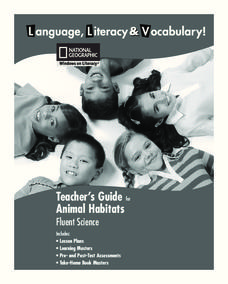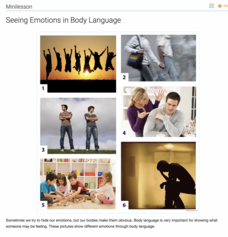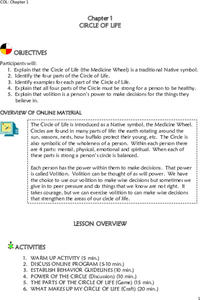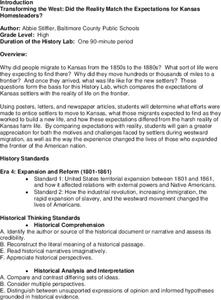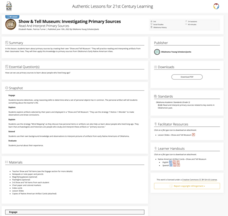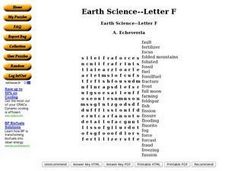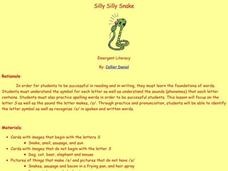Briscoe Center for American History
Identifying Primary Source Documents
Who is Mary Maverick and why is she important? the focus of this, the second in a series of five lessons that are designed to introduce middle schoolers to how historians use primary source documents to understand the past, is on how to...
Florida Center for Reading Research
Phonological Awareness: Phoneme Isolating, Move and Tell
Build phonological awareness with this fun game focused on isolating and identifying medial phonemes. This game board contains an image on each square; when the child lands on a square, they must say the medial sound of the word they...
King Country
Lesson 9: Communication - Day 2: Assertiveness
Appropriate assertive and non-verbal assertive communication is the focus of this lesson plan designed for the special education classroom. Using mirrors, class members practice assertive responses to a variety of situations.
King Country
Lesson 25: HIV/AIDS & Other STDs - Day 2: Sexually Transmitted Diseases
Sexually transmitted diseases (STDS) are the focus of a lesson that examines different types of STDs, how to avoid catching or transmitting these diseases, identifying the symptoms of STDs, and reporting procedures.
King Country
Lesson 22: Reproduction - Day 4: Sexual Decision-Making
This fourth lesson on sexual decision-making helps class members identify issues that should be considered before engaging in a sexual relationship. In addition, different types of sexual expression are discussed. The focus of the lesson...
King Country
Lesson 13: Communication - Day 6: Decision-Making
Decision making, including decisions that are made for us by others, decisions that are easy to make, and those that are not are the focus of a skill-building lesson that provides class members with a four-step decision-making model....
National Geographic
Animal Habitats
Explore animal habitats and reinforce speaking, listening, reading comprehension, and writing skills with a unit that focuses on the Arctic, desert, ocean, prairie, and rainforest. Enthusiastic scientists read informational text to...
Virginia Department of Education
Biotechnological Issues and Bioethics
Culminate a bioethics unit with the implementation of a lesson that incorporates the Socratic method to encourage class feedback and participation. Pupils participate in a discussion on bioethics and morality, complete a writing seminar,...
Tennessee State Museum
Understanding Women’s Suffrage: Tennessee’s Perfect 36
Tennessee was the pivotal state in ratifying women's suffrage in 1920, with its vote coming down to one man: Harry Burn, a 24-year old state representative who changed his nay to an aye on the advice of his mother. Learn more about...
California Department of Education
An Online Tool I Can Use
Tools for school—and beyond! Introduce your sixth graders to online tools to plan their academic and professional futures. The fifth and final lesson in a series of career and college readiness activities focuses on a scavenger hunt to...
Thoughtful Learning
Seeing Emotions in Body Language
Scholars test their skills of reading body language with a collaborative learning experience that focuses on showing and identifying emotions. Pairs take turns acting out an emotion, one uses body language while the other guesses what...
Healthy Native Youth
Chapter 1: Circle of Life
Volition, or will-power, is the focus of a instructional activity that brings forth the Native symbol, the Circle of Life, to instill the importance of responsible decision-making. Scholars take part in six activities that empower them...
Learning to Give
Deliver Gratitude Day
Gratitude is the focus of a discussion that sets the stage for pupils to take part in a service-learning project in which they deliver notes of kindness by way of social media or mail. A reflection closes the learning experience.
Scholastic
Pilgrim and Wampanoag Daily Life
A lesson looks at the Pilgrims and Wampanoag tribe during the first Thanksgiving. Scholars compare and contrast information presented by an online activity then discuss their findings. Learners examine the two group's daily routines and...
Center for History Education
Transforming the West: Did the Reality Match the Expectations for Kansas Homesteaders?
They expected good soil and hearty crops ... but they found buffalo chips and grasshopper plagues. Using an advertisement encouraging famers to go west, budding historians examine primary sources including letters, photographs, and...
K20 LEARN
Show and Tell Museum - Investigating Primary Sources: Read and Interpret Primary Sources
Scholars become detectives in a lesson that focuses on primary sources. Learners practice their observational skills by examining the teacher's artifact and visiting the Show and Tell Museum that highlihgts items from peers and learning...
Curated OER
The Cultural Significance of Naming
The Navajo would disagree with Shakespeare that the naming of things is irrelevant. Navajo people have to earn their names. Middle schoolers learn about the cultural significance of Navajo names in a lesson that uses a video and reading...
Curated OER
Earth Science--Letter "F"
In this earth science worksheet, students locate and identify vocabulary terms related to earth science that begin with the letter "F." There are 24 words located in the puzzle.
Curated OER
Letter Patterns
Second graders look at the number patterns we get from letters and numbers. They keep track of the numbers involved by drawing up a table of values. It's important here to look for the pattern and see how the number of tiles changes from...
Curated OER
Emergent Literacy
Students practice speaking and spelling words, and recognize and demonstrate understanding of sounds (phonemes) that each letter contains. Students focus specifically on letter S and its sound.
Curated OER
ABC BINGO
Students participate in a homemade ABC Bingo game to reinforce the alphabet. They write a different lower case letter in each block on their card and continue until the card is filled up.
Curated OER
Keyboarding - Keying by Letter
Students play a keyboarding game to increase accuracy. They are given a letter of the alphabet. They type as many words as they can using that letter. Each time they use that letter it is worth one point.
Curated OER
Eehh?" is for Eleven Elephants
Students complete a variety of activities related to the short /e/ sound. As a class they recite a tongue twister, then trace and write the letter E. Students then listen to word pairs and identify the word containing the short /e/...
Curated OER
Key Pals
Second graders analyze the proper form of friendly letters and write emails to a key pal. In this friendly letters and email instructional activity, 2nd graders discuss sending friendly letters and view examples of the letter format....








